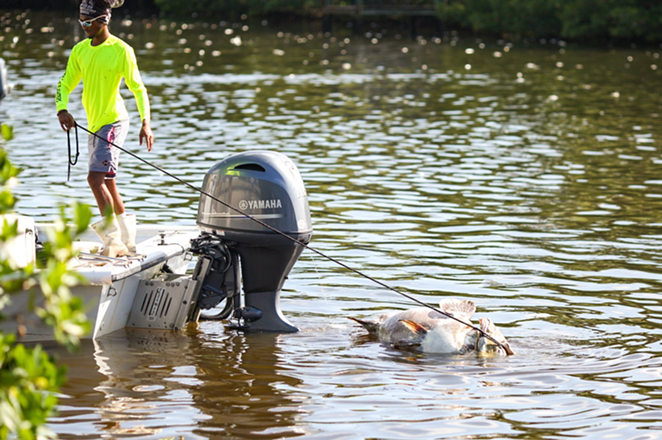
This morning, St. Petersburg mayor Rick Kriseman said the city is spread thin collecting hundreds of tons of dead sea life.
So far, workers have accumulated 500 tons since July 1, says Kriseman. The animals include dolphins, sea turtles, eels and stingrays. "It's pretty awful. The odor sticks to you. It stays in your nasal passages,” he said during the news conference, which was held at Crisp Park. “Then, there's the emotional toll of just dealing with all the dead animals.”
As Kriseman spoke, workers behind the mayor scooped up dead fish with pool skimmers and a fishing net.
According to St. Pete's Public Works Administrator, Claude Tankersley, around 200 workers are doing this every day. Kriseman added that the dead fish eruption has no foreseeable end.
“Our city teams can only keep at this for so long,” he said during the news conference. “We are asking the governor, please ... we need your help.”
All they need is more resources to help with the clean-up, like wider nets, the mayor said. Catfish frequently become tangled in the small nets and city workers have to individually pluck the fish out with grabber tools. The process is exhausting, he said. A spokesperson for the mayor, Benjamin Kirby, said the city also wants more shrimp boats.
The workers from sanitation, parks and recreation, public works, engineering and police and fire stations are also extended past their designated roles. As a result, they've had to cast aside other work like lot clearing, tree trimming, sidewalk repair and gutter repair. Kriseman said he did not know the cost but believes it is up to six figures.
“We’re going to have to juggle resources to cover it,” Kriseman said. “This is obviously not something we budgeted for.”
Thank you to our city team for their hard work and to our residents and business community for their patience. I know this is unpleasant. I know it's maddening and we want to point fingers. Let's just focus, and get through this as we always do in St. Pete. We are resilient. pic.twitter.com/5QaArLNpjk
— Rick Kriseman (@Kriseman) July 14, 2021
While Rick Scott was governor, the mayor pointed out that he declared a state of emergency during the Red Tide and sent help. Between Kriseman’s office, lobbyists, council members and Commissioner Nikki Fried, the city has reached out to Governor DeSantis; but they have yet to hear back.
The Red Tide, which is large “blooms” of toxic algae that spread through the water, kills the fish and can even harm humans. This year, rotting fish from the gulf have washed up on the shores of the bay, Kriseman said, and he speculates that is because of Tropical Storm Elsa.
While the Red Tide may also be exacerbated by climate change or the Piney Point wastewater leak, Kriseman said St. Petersburg's people are resilient.
“Let's just focus, and get through this as we always do in St. Pete,” he tweeted on Wednesday.
Eventually, he said modernizing infrastructure may improve the water quality, but for now, the focus is on the clean-up, and they will keep at it for as long as they can.
Support local journalism in these crazy days. Our small but mighty team works tirelessly to bring you news on how coronavirus is affecting Tampa and surrounding areas. Please consider making a one time or monthly donation to help support our staff. Every little bit helps.
Subscribe to our newsletter and follow @cl_tampabay on Twitter.

